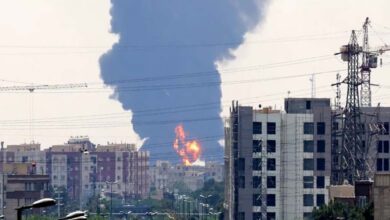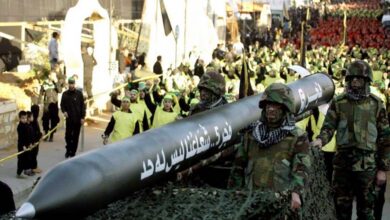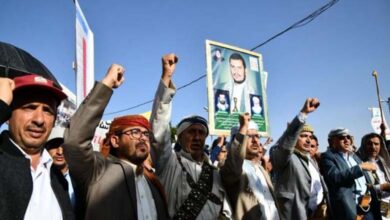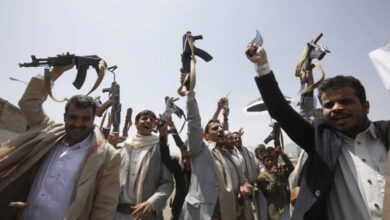Yemeni Journalists’ Syndicate Reports on “Crimes” by Houthis and the Muslim Brotherhood against Its Members
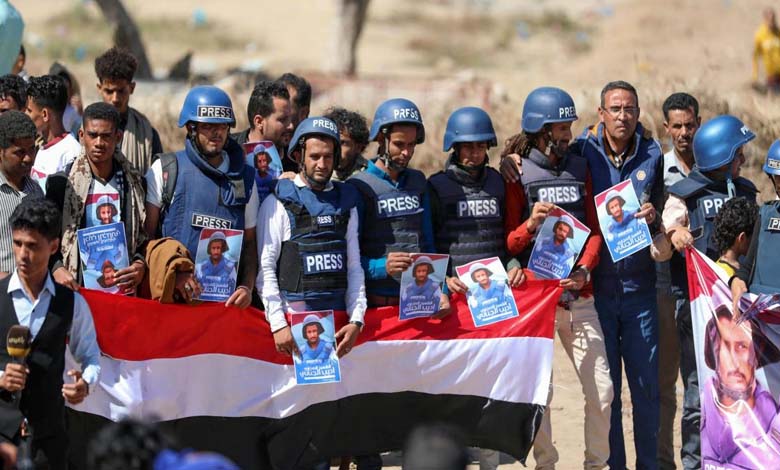
In the midst of the Yemeni crisis, between the Houthi coup and the “opportunistic” practices of the Muslim Brotherhood, journalists in the country face dire conditions that sometimes lead to murder.
-
Terrorism: A Product of the Muslim Brotherhood and the Houthis… Yemenis React to Major Massacres in the South
-
Terrorism: A Product of the Muslim Brotherhood and Houthis… Yemenis React to Large-Scale Massacres in the South
According to the Yemeni Journalists’ Syndicate, there have been over 1,600 violations of media freedoms in Yemen since the war began (2015-2023), including 45 cases of murder.
A statement from the syndicate, issued last May, indicated that these violations—particularly murder, kidnapping, enforced disappearances, torture, and suppression of freedom of opinion and expression—were widely practiced in areas controlled by the Houthis.
-
Houthis and Muslim Brotherhood fail Muscat negotiations… Latest developments
-
New Agreement between Houthis and Muslim Brotherhood… What’s the Matter?
It noted that the Yemeni capital, Sanaa, as well as Hodeida, Dhamar, Ibb, Amran, Al Mahwit, and areas in Taiz and Marib, were regions witnessing violations against Yemeni journalists.
The syndicate continued that the Houthi militias not only repressed journalists in these areas but also committed murders, assassinations, targeting, and incitement against dozens of journalists in liberated areas.
-
Yemeni analyst reveals major corruption in sectors of the Muslim Brotherhood and the Houthis
-
Between Athletism and Friendship: Muslim Brotherhood’s Stance Revealed through their Interactions with Houthis
Yemeni journalists stated that the violations against them coincided with the Houthi militia coup against the Yemeni state a decade ago, as they sought to obscure their crimes by silencing the voice of truth in an attempt to enhance their repressive grip on freedom of expression.
Houthi Incitement
The leader of the Houthi militias, Abdel-Malek al-Houthi, is one of the first to incite against journalists, media professionals, and activists, having ordered his armed elements to wage a repressive war against journalists across various regions.
-
Between the Houthis and the Muslim Brotherhood… Playing Openly
-
Houthis and the Muslim Brotherhood: similar decisions reflecting sectarianism… Details
Al-Houthi appeared in a televised address on September 20, 2015, just months after the outbreak of the war, inciting against journalists, media professionals, and intellectuals, threatening that actions would be taken against them.
The impunity of perpetrators of violations against Yemeni journalists has contributed to classifying Yemen as the third most dangerous country in the world for journalists’ lives, according to a report by Reporters without Borders published in 2021.
-
Houthis and Muslim Brotherhood disrupt healthcare in Yemen… Children pay the price
-
The Houthis and the Yemeni Muslim Brotherhood visit Hamas Office in Sanaa… What are their real objectives?
In a recent report, the international organization confirmed that Yemen ranks poorly in press freedom, coming in at 154th out of 180 countries for 2024.
Human Rights Demands
Forty-five regional and local organizations concerned with freedom of opinion and expression and human rights have called for justice, urging that those involved do not go unpunished and that those responsible for all crimes against journalists and media activists be held accountable.
-
Due to the Brotherhood and the Houthis… Disasters and Tragedies on the Roads of Taiz
-
The UN Exposes the “Opportunistic Alliance”: Collaboration between Houthis and Al-Qaeda in Yemen
The statement, which coincides with the International Day to End Impunity for Crimes Against Journalists, observed on November 2 each year, indicates that journalists face violence, harassment, and murder based on their writings and opinions, which has exacerbated the impunity of perpetrators.
The statement emphasized that over the past ten years, journalists have been victims of various crimes and violations, including extrajudicial killings, arbitrary detention, enforced disappearances, torture, and restrictions on freedom of expression.
-
Residents of Southern Yemen Pay the Price of a Sinister War Led by the Muslim Brotherhood and Houthi Militias
-
Muslim Brotherhood Accused of Assassination Attempt in Taiz, Yemen
The declaration from the 45 regional and local organizations called on the international community to pressure the parties involved in the conflict to put an end to the assaults and enhance protection for journalists.
The statement also expressed concern over the death sentence issued against Taha al-Mamari, owner of Yemen Digital Media, by the specialized penal court in Sanaa, as well as the confiscation of his properties and the retrial of four journalists who had previously been released in a prisoner exchange between the government and the Houthis under the auspices of the United Nations.
-
Arrests and Kidnappings… Houthi Militias Continue Their Crimes
-
Houthis Close Religious Centers That Disagree with Their Doctrine in Three Governorates
It highlighted that these arbitrary practices by Houthi militias reveal the brutal and repressive approach these militias adopt against journalists, leading to the desertification of their areas by independent and partisan journalism.
Repression by the Muslim Brotherhood
In this context, journalist and social researcher Salah Abdul-Wahid stated that ideologically-driven religious groups are, by nature, opposed to freedom of expression and speech, which is why they seek to repress anyone who opposes them. “This is exactly what the Houthis and the Muslim Brotherhood are doing in Yemen,” he added.
-
Houthis and Humanitarian Organization Employees: Information in Exchange for Freedom
-
The Latest Crimes of the Muslim Brotherhood in Marib, Yemen
Abdul-Wahid clarified that since the beginning of the war, many cases of repression against journalists have been documented by Houthi militias, followed by the Islah party, the political wing of the Muslim Brotherhood in Yemen, which together share in the violations against journalists.
He added, “What concerns religious groups the most is that journalists reveal through their pens and words their crimes, violations, and repressive practices against people. That is why they seek to silence any dissenting voice, intimidate, and repress those who might expose the ugliness of their crimes against Yemenis.”
-
Suspicious Houthi and Muslim Brotherhood Movements in Yemen’s Shabwah… Details
-
Following in Daesh’s Footsteps… The Houthis Spoil Yemeni Celebrations


